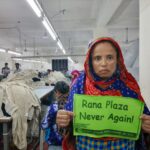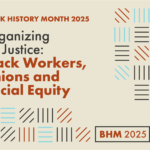
Canadian Labour Congress Brings Best Practices to Nigerian Fight Against HIV/AIDS
In 2014, the Canadian Labour Congress took on an unprecedented task: to take the resources and best practices developed to address HIV/AIDS in the workplace in Canada and bring them to Nigeria.
After the CLC brought the idea to the Canadian High Commission in Nigeria, the Nigerian Labour Congress, the Nigerian government, the Nigeria Employers’ Consultative Association (NECA) and other key partners signed on to the project. The goal would be to adapt lessons from Canada in order to assess Nigeria’s compliance with the International Labour Organization (ILO) standard on HIV/AIDS, and make recommendations for change.
“We came out with an historic agreement between unions, government and employers to take the first steps towards making Nigeria’s workplace sites of progress in the fight against HIV/AIDS,” said CLC President Hassan Yussuff.
Now, on World AIDS Day, December 1st 2015, the Canadian Labour Congress and its partner, the International Trade Union Confederation (ITUC-Africa) are planning the next steps for Nigeria, and looking to expand the model agreement to other African nations.
In Nigeria, there is still work to be done to complete the assessment and recommendations, and hurdles are likely to emerge, such as the criminalization of homosexuality in that country.
“The ILO standards acknowledge that we cannot fight HIV/AIDS without also fighting stigma, discrimination and inequality,” Yussuff stated, “The process cannot ignore that.”
Ultimately, Yussuff hopes having all the key players at the table – along with invited representatives from other governments with strong HIV/AIDS strategies: Norway, Sweden, the United Kingdom, and United States will lay the foundation for improving human rights at the same time as public health.
While participating governments supplied some funding for the work in Nigeria, The CLC’s HIV/AIDS Labour Fund was also instrumental. The fund was established in 2003 to assist the CLC and its affiliates to support unions in the global South to prevent HIV/AIDS and address the impact on workers and their families.
Since its inception, more than $500,000 has been raised and put towards union and workplace programs and policy advocacy in the following countries: Nigeria, Tanzania, Kenya, Zimbabwe, Uganda, Mozambique, Senegal, Ghana, Botswana and Rwanda. For example, the fund has supported peer education, testing and counseling programs, union HIV/AIDS conferences, surveys, production of awareness and training materials and specific projects on supporting women and gender analysis in HIV/AIDS work.
“Thousands of workers in Africa have received preventative education and counselling treatment because our Labour Fund has supported the HIV/AIDS work of their unions,” Yussuff said.
Yussuff sees this work as a key part of the labour movement’s role in advancing the UN’s new Sustainable Development Goals (SDGs). Goal 3 is “to ensure healthy lives and promote well-being for all at all ages,” includes a target of ending AIDS by 2030.
“Unions, governments and employers in all countries need to work together for us to meet the UN target of ending the AIDS epidemic by 2030,” said Yussuff.





